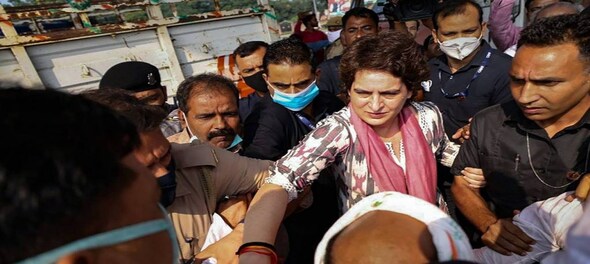
The announcement by Congress in Uttar Pradesh to set aside 40 percent of the seats for women candidates in the next assembly elections was met with surprise and cynicism. Priyanka Gandhi Vadra caught many students of politics by stealth. Of course, many party workers and a majority of whom were women, welcomed the declaration.
In a way, the proposal set the cat among pigeons with a leading political party leader and high stakes in Uttar Pradesh dismissing the announcement as tokenism. The leader likened it to the Congress appointment of a Scheduled Caste leader Charanjit Singh Channi, as a replacement for Chief Minister Captain Amarinder Singh.
It would be naïve to believe the Congress party general secretary incharge of Uttar Pradesh to make such a major policy proclamation at the spur of the moment. On her part, Gandhi articulated the thought process behind the move as one compelled by the searching questions she endured from women during the past two years she remained active in the state. The issue of empowering women who continue to face challenges in all fields, especially politics, is not an unknown phenomenon and the Congress pursued this line for decades.
Women empowerment through association in political office was a brainchild the party attributes to Rajiv Gandhi. The move as the then Prime Minister to bring about a change in the Constitution by enacting the third tier of governance in the form of Panchayati Raj Institution with 30 percent reservation for women is said to be a case in point.
Also Read
Moving the 64th Amendment Bill during May 1989, Rajiv Gandhi described it as a Constitutional innovation and outlined three reasons for it. One, women constituted half of the population, and involved in more than half the economic life; second, sound finances of the household was the traditional responsibility of women with an ingrained habit of financial discipline and fiscal responsibility; and, the third, women in India in their role as grandmothers and mothers, have been the repository of India’s ancient culture and traditions.
“It is to them that is entrusted the responsibility of transmitting to the next generation the quintessential values, standards and ideals which have enabled our civilisation to survive and flourish without a break deposited vicissitudes of many kinds. It is that strength of moral character which women will bring to the Panchayats…let us give them a warm welcome…” Rajiv Gandhi said in the Lok Sabha. However, the Bill could not get past the Rajya Sabha. Subsequently, the commitment was fulfilled by the PV Narasimha Rao government.
Several years later and after much political wrangling, the Congress under Sonia Gandhi pushed the contentious Constitutional Amendment Bill providing for one-third reservation for women in Parliament and State Legislatures. In order to demonstrate the party’s firm commitment and in the light of previous experience, the Bill was introduced in the Rajya Sabha so that it would not lapse.
The Council States enacted the Bill on March 9, 2010, amid high drama leading to Marshal being summoned by the Chairman. It was passed a day after International Day of Women but never moved further in the 15th Lok Sabha before the House was dissolved.
Coming back to the decision of the Congress to allocate 40 percent seats will mean that of the 403 seats in the State Assembly, the party will have to set aside 161 seats for women. Cynics will contend there are several hurdles including that the Grand Old Party is but a mere shadow of what the organisation was till the 1980s; the party will find it extremely difficult to search for candidates who can measure up to the ‘winnabilty’ factor that weighs final selection; the inherent opposition from already scarce workers and entrenched cadres especially men who would find this route a block to further their political journey; and finally, how would the party ensure women selected are not proxies for influential men at home, a practice noticed in Panchayats.
Then the track record of most political parties in this regard is nothing to write home about. While most parties express support for women’s reservation, barring the Trinamool Congress and the Biju Janata Dal in the 2019 general elections, most parties, especially national outfits, did not demonstrate any commitment to allocate a greater number of seats for women.
In the absence of any law providing for a definite number of seats to women, civil society groups did raise the issue of parties voluntarily allocating tickets to women in numbers that would translate to at least a third of the total candidates fielded in an election. The argument remained largely unattended.
This is where the Congress in UP took the lead. The October 19 announcement should queer the pitch for other political parties when the time comes to finalise tickets. Parties in government can put forth all data to prove more was done than ever before to improve the lot of women, increase the quality of life and in providing relief from daily drudgery. Yet political empowerment remains a far more potent tool and an idea the Congress with stakes or no stakes brought it to the table.
— KV Prasad is a senior journalist and has earlier worked with The Hindu and The Tribune. The views expressed are personal.
(Edited by : Ajay Vaishnav)
Check out our in-depth Market Coverage, Business News & get real-time Stock Market Updates on CNBC-TV18. Also, Watch our channels CNBC-TV18, CNBC Awaaz and CNBC Bajar Live on-the-go!


Andhra Pradesh Lok Sabha elections: A look at YSRCP candidates
Apr 25, 2024 6:54 PM
Lok Sabha elections 2024: Banks and schools to remain closed in these cities for phase 2 voting
Apr 25, 2024 5:33 PM
Andhra Pradesh Lok Sabha elections: Seats, schedule, NDA candidates and more
Apr 25, 2024 5:16 PM

